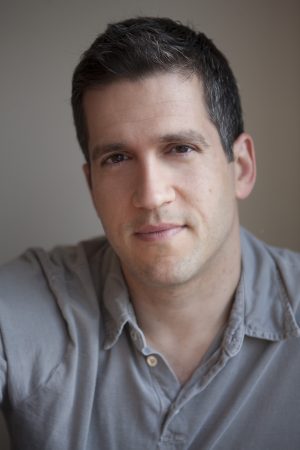Panio Gianopoulos
I don’t often ask myself this question. The question I usually find myself asking is Why don’t I write? Or even more commonly, why didn’t I write? Why didn’t I write this morning when our puppy woke me up at dawn, scratching and whining at its crate door, and after putting him outside with his dish, I lingered in the dark kitchen of our sleepy house, my laptop within easy reach on the table. Why didn’t I write last weekend, when my children were riding their bikes outside, cycling up and down the street with the neighbor kids, shouting out inscrutable rules to erratic games. Why didn’t I write when I was staring out the window of the train coming home from work yesterday, or the day before yesterday, or the day before that? And the week before that?
Today, while racing my 13 y/o daughter’s red bike along the old aqueduct path that leads to the train station—this junky bike with its crooked handlebars and hyper-sensitive brakes that I know won’t get stolen—I accidentally realized the answer to this recurring question. Why didn’t I write? Not because I’m lazy (though I can be), or because I’m uninspired (though I can be), not because I’m tired (I’m always tired) or distracted (that too) or afraid of failure (no one has to read it), it’s because writing anything good requires feeling something. Anything I’ve ever written that I’ve been proud of, anything more than a bit of wordplay or prettiness, anything that’s worthwhile, that resonates deeply with a reader—this demands an emotional involvement. It requires rousing ourselves from the curated sleepwalk that is modern life—entertainment and diversion any and all the time, nestled in the palm of our hand—and stepping into pain, discomfort, sadness, and fear. There’s happiness, too, of course, there’s excitement and passion and intrigue, flirtation and nostalgia, curiosity and discovery—but pain and its unforgiving friends are right there at the center of it all. And it’s tempting, unbelievably tempting, to avoid that pain.
Why not? What else do we do in our ordinary lives but avoid pain? We try our best to insulate ourselves from pain, to predict and evade it, to position ourselves and our family so that it can’t touch us.
This isn’t a moral failure, incidentally. It’s sensible. It’s strategic. It’s mostly inevitable: avoiding pain is a biological imperative, what the amoeba does, as do the starfish, the hummingbird, and the ape. It’s an impulse that I understand intimately, cellularly. But it’s also the impulse that holds us back when we try to create something great. Because while avoiding pain is natural, it’s also the death of art. Art is the truth. It dabbles in lies and fictions and misdirection, but these are all part of the bigger truth: this agonizing, fascinating, frequently unbearable collision of emotions and actions called life. I don’t care if you’re writing a novel, choreographing a dance, or staging a puppet show, if you sidestep pain and emotion, if you won’t go near discomfort, anxiety, and worry—even to transform them—then you’re just messing around. You might even fool some people for a while, but you’ll know. Is it real? Did you truly do what you could have, what you should have, done?
You’ll know.

